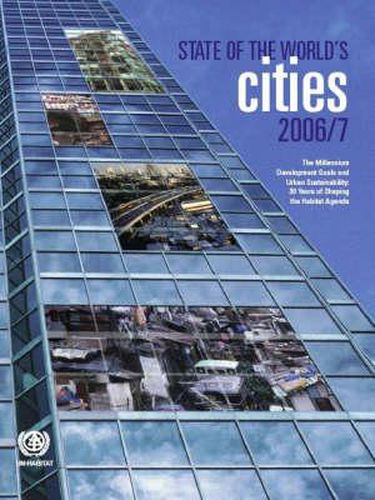Readings Newsletter
Become a Readings Member to make your shopping experience even easier.
Sign in or sign up for free!
You’re not far away from qualifying for FREE standard shipping within Australia
You’ve qualified for FREE standard shipping within Australia
The cart is loading…






Sometimes it takes just one human being to tip the scales and change the course of history. In the year 2007, that human being will either move to a city or be born in one. Demographers watching urban trends will mark it as the moment the world entered a new urban millennium, a period in which, for the first time in history, the majority of the world’s people will live in cities. The year 2007 will also see the number of slum dwellers in the world cross the one billion mark - when one in every three city residents will live in inadequate housing with no or few basic services.
Although poverty remains a primarily rural phenomenon, urban poverty is becoming a severe, pervasive - and largely unacknowledged - feature of urban life. UN-HABITAT findings reflected in the State of the World’s Cities Report show how inequality in access to service, housing, land, education, health care and employment opportunities within cities have socio-economic, environmental and political repercussions, including rising violence, urban unrest, environmental degradation and underemployment, all of which threaten to diminish any gains in income and poverty reduction. The findings reveal ‘a tale of two cities within one city’ and unfold a new urban reality, where slum dwellers die earlier, experience more hunger, have less education, have fewer chances of employment in the formal sector and suffer more from ill-health than the rest of the urban population.
What comes out clearly in this Report is that slum formation is neither inevitable nor acceptable. ‘Running the poor out of town’ - through evictions or discriminatory practices - is not the answer: rather, helping the poor to become more integrated into the fabric of urban society is the only long-lasting and sustainable solution to the growing urbanization of poverty. Ultimately, as the developing world becomes more urban ad as the locus of poverty shifts to cities, the battle to achieve the Millennium Development Goals will have to be waged in the world’s slums.
$9.00 standard shipping within Australia
FREE standard shipping within Australia for orders over $100.00
Express & International shipping calculated at checkout
Sometimes it takes just one human being to tip the scales and change the course of history. In the year 2007, that human being will either move to a city or be born in one. Demographers watching urban trends will mark it as the moment the world entered a new urban millennium, a period in which, for the first time in history, the majority of the world’s people will live in cities. The year 2007 will also see the number of slum dwellers in the world cross the one billion mark - when one in every three city residents will live in inadequate housing with no or few basic services.
Although poverty remains a primarily rural phenomenon, urban poverty is becoming a severe, pervasive - and largely unacknowledged - feature of urban life. UN-HABITAT findings reflected in the State of the World’s Cities Report show how inequality in access to service, housing, land, education, health care and employment opportunities within cities have socio-economic, environmental and political repercussions, including rising violence, urban unrest, environmental degradation and underemployment, all of which threaten to diminish any gains in income and poverty reduction. The findings reveal ‘a tale of two cities within one city’ and unfold a new urban reality, where slum dwellers die earlier, experience more hunger, have less education, have fewer chances of employment in the formal sector and suffer more from ill-health than the rest of the urban population.
What comes out clearly in this Report is that slum formation is neither inevitable nor acceptable. ‘Running the poor out of town’ - through evictions or discriminatory practices - is not the answer: rather, helping the poor to become more integrated into the fabric of urban society is the only long-lasting and sustainable solution to the growing urbanization of poverty. Ultimately, as the developing world becomes more urban ad as the locus of poverty shifts to cities, the battle to achieve the Millennium Development Goals will have to be waged in the world’s slums.